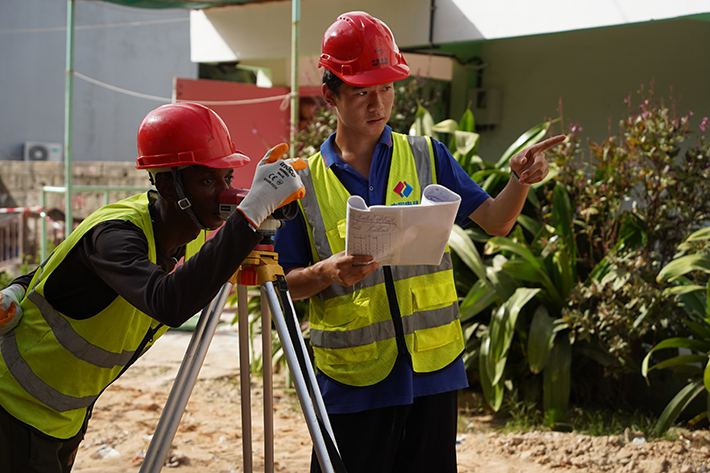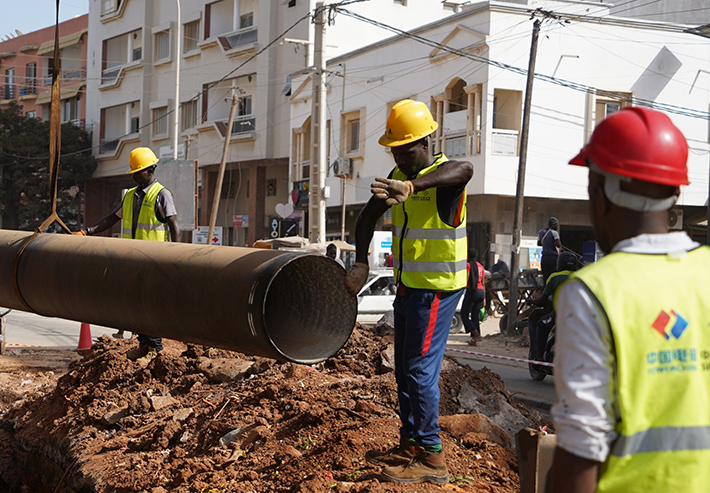|
||||||||||
| Home Nation World Business Opinion Lifestyle ChinAfrica Multimedia Columnists Documents Special Reports |
|
||||||||||
| Home Nation World Business Opinion Lifestyle ChinAfrica Multimedia Columnists Documents Special Reports |
| ChinAfrica |
| Winning Hearts |
| Sinohydro and Senegal join forces to provide drinking water in Dakar |
| By Aly Diouf | VOL. 16 March 2024 ·2024-03-25 |

A Chinese engineer and a Senegalese employee work on the project site in Dakar, Senegal, on 1 November 2023 (XINHUA)
Sinohydro, a subsidiary of PowerChina, is currently engaged in efforts to substantially enhance the potable water supply in Dakar, Senegal. A diligent group of Chinese and Senegalese workers is engaged in round-the-clock efforts along the Avenue du Front de Terre prolongée, which marks the starting point of the Route des Pères Maristes, with the objective of improving the distribution network for potable water in the Dakar Department. With a population density of 7,277 inhabitants per square km and an estimated 1.18 million inhabitants in 2023, there is an evident and increasing need for potable water. This need is further compounded by significant water loss caused by the advanced age of the pipelines, with some pipes dating back to the colonial era.
Within this framework, a consensus has been achieved with the assistance of the Japan International Cooperation Agency (JICA) to increase water provision through the construction of a new desalination facility in Dakar’s Mamelles district. Furthermore, the undertaking encompasses the substitution of antiquated and deteriorating pipelines. Nearly 137 billion CFA francs ($230 million) have been allocated by Japan via JICA to Senegal to secure and expand access to potable water in the capital and adjacent areas, as well as to reduce water losses through piping renovations. These actions align with governmental strategies that prioritise the fulfilment of water requirements, the fortification of infrastructures for production and distribution, and the preservation of the security and viability of current systems.
The desalination project is being managed by the Société nationale des eaux du Sénégal (SONES), the principal contractor. The project has the capacity to produce up to 50,000 cubic metres of drinking water per day, with the possibility of increasing to 100,000 cubic metres per day. The endeavours encompass two distinct stages, with the primary targets being the enhancement of the distribution infrastructure in Dakar via sectorisation and the substitution of pipelines, including connections and valves.
Approximately 175 km of pipelines spanning in diameter from 90 to 1,000 millimetres are installed in the Almadies, Parcelles Assainies, Grand-Yoff, and Mermoz-Sacré-Coeur districts during the initial phase. Approximately 141 km of pipelines spanning in diameter from 90 to 700 millimetres are included in the second phase in the Greater Dakar, HLM, and Dakar Plateau regions. The awarding of both lots to Sinohydro represents a significant milestone in the collaborative endeavour to enhance potable water accessibility in Dakar.
Local personnel
Charles Fall, the Managing Director of SONES, emphasised the criticality of strictly adhering to the project schedule, as directed by Macky Sall, president of Senegal. He emphasised the sophistication of the reverse osmosis desalination system implemented at the facility. This technology produces potable water that complies with the global standards set forth by the World Health Organisation while consuming less energy. By passing the water through a membrane that retains the ions and is circulated under high pressure, the water is filtered to separate it from the brine. The brine is subsequently dispersed in the open sea in adherence to the principles of environmental sustainability.
Desalinated water, according to Fall, will lessen reliance on water from 250 km distant Lac de Guiers and boreholes imperilled by salinity intrusion as a result of intensive water abstraction. Daily losses are estimated at 40,000 cubic metres. He noted that no initiative of this magnitude has been implemented to renew Dakar’s water supply network since the colonial era. The replacement of 316 km of pipelines represents a significant endeavour aimed at mitigating these losses, which are analogous to the mean productivity of a facility such as Ngnith.
The project, which commenced on 22 September 2021, reached an important turning point when 135 km of pipelines were finished, according to Ren Chuanke, a director at Sinohydro. In order to facilitate the seamless implementation of the project, the organisation has leveraged its local expertise by recruiting approximately 500 workers. These positions cover a wide range of skills, including engineers, labourers, surveyors, security guards, interpreters, machine and vehicle operators, welders, carpenters, masons and maintenance technicians.
Ren highlighted the challenges encountered during the execution of the project: “Dakar, with its rich history, has a complex underground pipe network, a high water table, a prolonged rainy season and the need to coordinate with multiple authorities during construction. These factors complicated the coordination of the work.” However, he emphasised Sinohydro and SONES’ commitment to overcoming these challenges and swiftly improve Dakar residents’ access to drinking water.
With this in mind, Fall described the implementation of a local and institutional communication strategy meant to keep communities informed of the project’s progress and to enhance exchanges. A concertation committee made up of members from the water, phone, road and IT sectors meets once a quarter under the direction of Dakar Governor Al Hassan Sall. The goal is to coordinate their efforts and guarantee that the sites are returned to their former condition.

A water pipe is being installed in Dakar, Senegal, on 1 November 2023 (XINHUA)
Environmental considerations
In order to expedite the project’s construction timeline, Ren announced the recent adoption of a new approach. Working in parallel on multiple fronts, teams implementing this strategy operate nonstop. “We presently have 15 day and seven night shift teams, as well as 8 pavement restoration teams and two pressure testing teams. Each of these teams consists of a core of Chinese engineers or senior technicians, as well as an additional number of Senegalese workers.
“This organisation not only allows us to make quicker progress, but it also helps to develop a local workforce specialised in water pipe building, therefore increasing the relationship between China and Senegal,” Ren said. “We are firmly committed to overcoming all obstacles to ensure the success of the project, with the aim of improving water supply in Senegal.”
In terms of the project’s environmental impact, the partnership between SONES and Sinohydro prioritises environmental preservation. “Our project team is acutely aware of local environmental issues and is committed to minimising the impact of the project on the local community,” said Ren. Prior to the start of the project, proactive measures were taken to ensure effective communication between health, safety and environment managers and local communities. This dialogue enabled the construction programme to be presented in detail and the concerns and suggestions of local residents to be listened to, thereby ensuring that their needs and interests were taken into account.
“We aim to protect the environment and respect the community throughout the construction process, taking care to minimise disruption to residents’ quality of life. We are certain that our collaborative efforts with the Senegalese people will result in this project’s amazing success,” Ren said.
| About Us | Contact Us | Advertise with Us | Subscribe |
| Copyright Beijing Review All rights reserved 京ICP备08005356号-5 京公网安备110102005860号 |